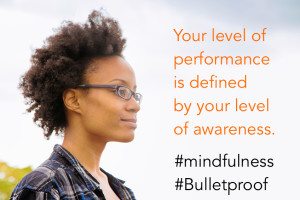
One of the most powerful bio-hacks around costs nothing. It requires no technology. Yet, it can affect your biology in profound ways.
You can use it daily to lift your performance and boost your energy. You can even use it to experience your food in a new way.
Bulletproof Diet Mindfulness — Sprinkle a blackberry or raspberry with Brain Octane Oil. Put it in your mouth. Push it upwards with your tongue until you smoosh it on the roof of your mouth. No chewing allowed. With your eyes shut, taste the juice, feel the texture of the fruit and seeds. Don’t swallow immediately, just pay attention to the burst of flavor and how your body responds.
So what is mindfulness?
The Center for Mindfulness at the University of Massachusetts describes it as:
“The intention to pay attention to each and every moment of our life, non-judgmentally.”
A key word there is “intention.” You see, mindfulness isn’t about perfection or reaching some artificial standard. It starts — and continues — with the simple daily decision that you want to become aware of what’s really going on inside you and around you. Once you’re firm in that intention, you just need to make an authentic effort to wake up to what is. That’s the practice, and it might be easier than you think. Some people do 45 minutes a day. Some do 10 minutes. But the duration is far less important than doing it regularly.
How is it different to meditation?
Well, mindfulness is a type of mediation. Meditation includes a variety of calming spiritual practices that focus on the present moment and seek to raise consciousness.
Western mindfulness has come to encompasses everything from breathing to walking to being in nature to eating berries (see above) – the main philosophy is that we should strive to be mindful for as much of our lives as possible. The Greater Good Science Center at the University of California at Berkeley defines the practice this way:
“Mindfulness means maintaining a moment-by-moment awareness of our thoughts, feelings, bodily sensations, and surrounding environment. Mindfulness also involves acceptance, meaning that we pay attention to our thoughts and feelings without judging them—without believing, for instance, that there’s a “right” or “wrong” way to think or feel in a given moment. When we practice mindfulness, our thoughts tune into what we’re sensing in the present moment rather than rehashing the past or imagining the future.”
Mindfulness Research
Sounds good, you say. But what about the research? Well, check it out:
Studies show mindfulness has demonstrated effectiveness in the following areas:
Research also shows it can impact effectiveness at work. Insurance giant Aetna offers mindfulness training to its employees.
Mindfulness practice also impacts performance in physical pursuits (influencing satisfaction and participation and flow state).
Mindfulness can even help you resist the temptation of eating kryptonite foods. This study found “participants’ levels of hunger no longer boosted the attractiveness of unhealthy foods, resulting in healthier eating choices.”
But in spite of the research and the upswing in media coverage over recent years, only 8 percent of Americans meditate, a common form of mindfulness practice, and 10 percent do yoga (which may or may not be mindful), according to the 2012 National Institute of Health Survey.
Is it time to take mindfulness mainstream? The U.S. Surgeon General, Dr. Vivek Murthy is leading by example.
Professor Richard Davison is a pioneer in neuroscience at the University of Wisconsin-Madison and the founder of its Center for Investigating Healthy Minds. This quote comes from a piece by Maria Shriver, and in it, he makes it clear that secular mindfulness can change both behavior and brain function:
“… The regular practice of simple forms of meditation can be taught in a completely secular way and that can train the mind to become more aware and to down-regulate negative emotions and increase the frequency of certain positive emotions.
Research in our laboratory has established that it does not take that much to make a difference. In a study that was published in 2013 on compassion meditation, we found that 30 minutes a day of practice over the course of two weeks was sufficient to produce a change in behavior and in brain function. Of course, we do not believe that such a change will endure unless a person continues to practice…” — Professor Richard Davison
Mindfulness & Abundance
Mindfulness also can lead to gratefulness — and both mindfulness and gratefulness are truly Bulletproof because they naturally lead to a sense of abundance in your life.
“The source of all abundance is not outside you. It is part of who you are. However, start by acknowledging and recognizing abundance without. See the fullness of life all around you. The warmth of the sun on your skin, the display of magnificent flowers outside a florist’s shop, biting into a succulent fruit, or getting soaked in an abundance of water falling from the sky. The fullness of life is there at every step. The acknowledgement of that abundance that is all around you awakens the dormant abundance within. Then let it flow out. When you smile at a stranger, there is already a minute outflow of energy. You become a giver.
“Ask yourself often: What can I give here; how can I be of service to this person, this situation?”
60 Second Exercise
Mindfulness has the potential to help everyone.
It won’t, of course.
Not everyone will take the opportunity.
But anyone can.
You can.
Here’s the deal. Most mindfulness practice starts with awareness of the breath. Which means no one living is excluded from its benefits. If you can breathe, you can find equanimity. If you can breathe, you can feel amazing. If you can breathe, you can perform better and enjoy life more.
Consider doing this 60-second exercise. Take three breaths. Inhale and say “I breathe in energy.” Exhale and say, “I breathe out gratefulness.” Or just say “energy” on the in-breath and “thank you” on the out-breath.
Then wait. Say nothing. Just listen and feel. What was it like? If you do this three days in a row, you may find yourself going through your life with less of a burden and more of a sense of lightness. (You can get free training on-line from a number of sources, like this one and this one.) With mindfulness, practice is the key. The more you do it, the better you will feel. Why? Because, in many ways, we choose our lives through how we pay attention.
Your performance, your energy, your happiness all begin with your awareness.
So don’t wait for mindfulness to come to you. It doesn’t work that way. You have to dive in. You can control your biology through your attention. So biohack your free-will and give it a try. It’s free. There’s nothing to lose. Except maybe a little ego.
Additional Resources:
Bulletproof Radio #243 – Rick Hanson: Forgetfulness, mindfulness techniques and hardwiring happiness
50 Shades of Zen – How to Meditate for More Results in Less Time
Bulletproof Mind – Upgrade Your Brain for Better Focus
Bulletproof Radio #336 – The World is Your Petri Dish with Bruce Lipton
Source: Bulletproof







